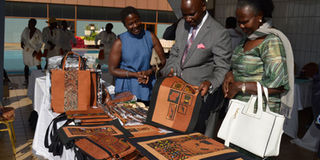Ugandans cash in on Commonwealth Parliamentary Conference

State Minister for Tourism Godfrey Kiwanda tours craft stalls alongside Commissioner tourism development Ms Grace Aulo during the launch of Handicrafts and Souvenir development project in Kampala recently. PHOTO BY ERONIE KAMUKAMA
Of the 1,000 delegates whom Uganda is hosting at the on-going 64th Commonwealth Parliamentary Conference (CPC) will each be spending about Shs7.3 million per day. All this money will end up in the wallets of Ugandans along the supply value chain.
According to the organisers, Parliament is only providing breakfast and lunch for the delegates.
Let’s break this down. If 1,000 delegates spend eight days in the country, each delegate will spend a minimum of $2,000 (Shs7.3m) per day alone.
According to Parliament, the delegates are paying for their accommodation. Some delegates might extend their cash to visiting entertainment places such as night clubs. It’s highly likely that they also buy Ugandan souvenirs in form of crafts, African wear, branded clothes or even taste the rolex.
This means Ugandans are expected to pocket close to Shs58.4b just from their eight-day visit to Uganda. The CPC conference provides a good opportunity for limitless networking among businesses with chances to pick lessons from what other industry players are doing through exhibitions and business-to-business linkages.
In an earlier interaction briefing, the host Speaker of Parliament Rebecca Kadaga said: “We expect the delegates to visit the country’s different tourism sites like national parks.”
At least 20 hotels and accommodation facilities were approved to host the CPC delegates within Kampala and Wakiso districts.
In case you’re already complaining that only Kampala and Wakiso are benefiting, you’re wrong. Reason: the organic pineapples from Luweero, matooke from Masaka, Bushenyi, citrus fruits from Teso, the rice from Kaliro and the tea from Tooro is being served in the listed hotels.
Speaker Kadaga said: “We are positioning CPC as a catalyst to promote Uganda as an investment destination.
“We expect some delegates will not stop at attending the conference but also there will be possible investment opportunities deals signed,” Ms Kadaga said.
Tourism
Uganda Tourism Board (UTB)’s chief executive officer Lilly Ajarova says the delegates will be served food and drinks, move around and as they do this, the employees of these facilities will directly benefit.
“The delegates will visit different tourism sites like the equator, Kagulu Hill where the local people will offer guiding services where they’ll earn commission,”Ms Ajarova shared.
Strategically, hosting the CPC conference presents a huge opportunity for Ugandans to earn some good money. Hosting such a high-profile event also attracts investments, raising Uganda’s profile as a preferred investment destination.
“This will help us to build on our image as a good tourism destination with hospitable people and attractions,” Ms Ajarova said.
In Africa in 2017, Uganda was ranked the eighth Meetings, Incentives, Conferences and Exhibitions (MICE) destination which was based on the number of conferences that year.
“We are also trying to position Uganda as a MICE destination, where we have facilities for meetings, conferences and events,” she shared.
Ms Ajarova added that hosting CPC will boost Uganda’s ratings because every international conference hosted is registered.
Ideally, MICE market involves a specialised niche of group tourism dedicated to planning, booking, and facilitating conferences, seminars and other events - a big moneymaker in the travel industry.
Hotels
So, how are Ugandans actually cashing in on this opportunity as the country?
Ms Jean Byamugisha, executive director of Uganda Hotel Owners Association, says the country hosting the CPC and many other conferences signals the beginning of growth for the MICE (Meetings, Incentives, Conferences, and Exhibitions) market in Uganda.
“The value chain in MICE is very big; from hotel accommodation to the food they will be eating, transportation and communication. The whole country benefits from MICE,” Byamugisha shares.
She says MICE is the next big market for Uganda’s tourism and the country is now competing for business with the more experienced countries such as Kenya, South Africa and Rwanda that have a more advanced MICE strategy including the convention bureaus.
“Hosting CPC is going to help us gain experience as well as build our MICE CV to bid for bigger conferences and events in future,” Byamugusha shares.
Crafts
Speaker Kadaga said that they have created crafts booths at different venues and hotels where the delegates will be staying. This is another way a Ugandan can benefit from the conference through selling their products.
Supplementing on this, Mr Nuwa Nyanzi, the Vice President National Art and Cultural Crafts Association of Uganda, has been allocated a stand at the conference venue for its members to exhibit and sell their products.
“As Nyanzi at my shop located at the African Village at the National Theatre is fully stocked with crafts and products and is expecting to cash in when the delegates visit,” He said.
He said it’s a big opportunity for Uganda to host a conference of this kind and they as National Arts and Cultural Crafts Association of Uganda (NACCAU) have the stocked the products that promote preserver Uganda’s culture.
Some of the products lined up for sale include; barkcloth products, wall paintings, subject matter covering the country’s social and cultural activities.
According to the Parliament’s director communications and public affairs Chris Obore they are spending close to Shs20b.
A big chunk of this budget has been spent on procuring 64 vehicles which are being used to transport the delegates.
Mr Obore said the vehicles are being fueled by companies such as Total and Shell which are now benefiting from the value chain.




